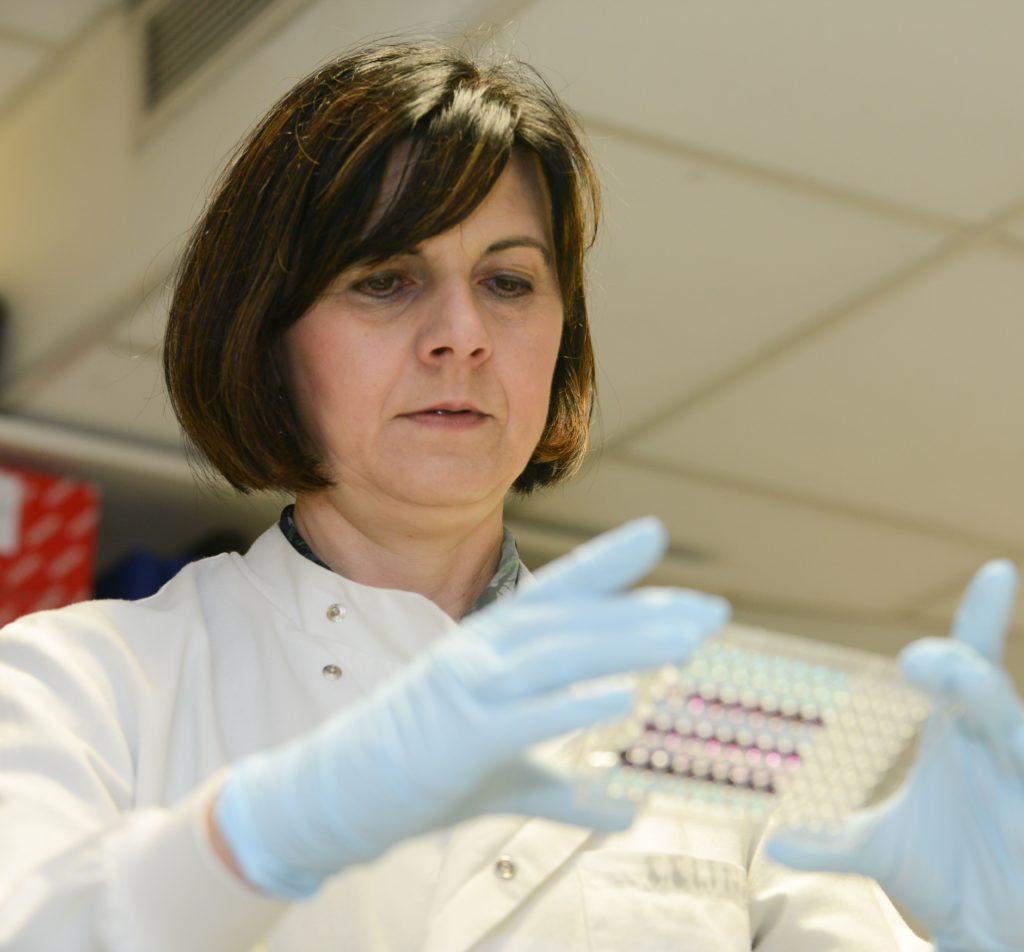Our Pancreatic Cancer Research:
From BCI Bench to Bedside

Today (18th November) marks World Pancreatic Cancer Day. Pancreatic cancer is the 10th most common cancer in the UK and incidence rates are expected to increase by 6% between 2014 and 20351. Pancreatic cancer has the lowest survival rate of all the common cancers, with a 5-year survival rate of less than 7%2. With this in mind, it is important that we come together to raise awareness about this cancer type, and the urgent need for early diagnosis and novel treatment strategies.
Pancreatic cancer is a core area of research focus at the Barts Cancer Institute (BCI), Queen Mary University of London, with a major aim being direct translation of laboratory research into clinical trials with the hope of improving outcomes for patients.
Progress towards early detection
As the pancreas is located deep in the abdomen, doctors cannot feel for any lumps during a physical examination, and there is a lack of specific symptoms in the early stages of the disease. Therefore, establishing an effective early detection method or diagnostic tool for identifying pancreatic cancer at the earliest stages is crucial to improving patient survival outcomes.

The UroPanc trial, led by Professor Tatjana Crnogorac-Jurcevic and funded by the medical charity Pancreatic Cancer Research Fund, is investigating the use of a non-invasive diagnostic test for pancreatic cancer using urine samples. The test works by measuring levels of three proteins (known as REG1, TFF1, LYVE1) in urine, which Professor Crnogorac-Jurcevic and her team found to be biomarkers of early-stage pancreatic ductal adenocarcinoma (PDAC; the most common type of pancreatic cancer) with over 90% accuracy.
The trial builds upon over 10 years of research by Professor Crnogorac-Jurcevic’s laboratory team. If the trial is successful and the accuracy of the biomarker panel is confirmed, the team hope that a standardised urine test could be developed for clinicians to use as a new diagnostic tool. This would be the first diagnostic test of its kind for early-stage PDAC and could allow more patients to receive treatment earlier.
In addition to the three proteins, the team is currently also studying other analytes in urine, and has recently reported on several metal elements, which could potentially, when combined with the protein panel, even further improve the accuracy of early PDAC detection.
Speaking of the trial, Tatjana Crnogorac-Jurcevic, Professor of Molecular Pathology and Biomarkers at BCI, said:
“The main and overarching goal of my research is its successful translation to the clinic, and we believe we are on the right track. We hope that our non-invasive urine test will, after validation in the UroPanc trial, enable earlier detection of PDAC at the stage when the patient is still amenable for curative surgery. This will hopefully result in a significant change of currently poor survival figures for such patients.”
Investigating new treatment strategies
The STARPAC2 clinical study, led by Professor Hemant Kocher and colleagues, is currently being set up following the positive results of the STARAPAC phase I trial, which found that the addition of ATRA (a form of vitamin A) to the standard chemotherapy regimen for pancreatic cancer to be safe for patients.

Previous laboratory work by Professor Kocher’s team discovered that treating star-shaped cells (called stellate cells) within pancreatic tumours with ATRA restricted tumour growth. Stellate cells, which have a vital role in tissue formation, can become corrupted during cancer development. The corrupted stellate cells contribute to the formation of the stroma, which is an impenetrable layer that sits around the pancreatic tumour and promotes its growth. The stroma restricts access of immune cells and drugs to the tumour, limiting the success of treatments.
As well as finding that the addition of ATRA to standard chemotherapy had no additional harmful effects in patients when compared with the standard chemotherapy alone, STARPAC also demonstrated that the combination does seem to modify the pancreatic cancer stroma in patients. The SRARPAC2 trial, funded by the Medical Research Council and Celgene, will now investigate whether the addition of ATRA to current standard chemotherapy can improve the treatment outcome in patients with locally advanced PDAC. Ultimately, the team hope that for some patients, this new treatment combination will shrink the tumour to the point where surgery can become possible to remove the remaining tumour.
Hemant Kocher, Professor of Liver and Pancreas Surgery at BCI and consultant at Barts Health NHS Trust, said:
“Pancreatic cancer is a difficult cancer to treat. The STARPAC2 trial examines the concept of whether we can target scar tissue around the cancer to make chemotherapy more effective. We hope recruitment to this pivotal trial can start soon.”
Pancreatic cancer - behind the scenes
Pancreatic cancer arises when abnormal pancreatic cells grow uncontrollably to form a tumour. Many types of tumours can grow in the pancreas, but the most common develops in the pancreatic ducts that carry enzymes important for digestion – this type of pancreatic cancer is called PDAC.
In most cases, mutations in the DNA disrupt the normal function of pancreatic cells. DNA is the source of “instruction” which a cell follows during its life cycle. Therefore, changes in a cell’s DNA will alter the instruction and may cause the cell to follow a different path. Cells can become cancerous when mutations accumulate over time, causing the cell to live past a normal cell’s life, and grow and divide uncontrollably. If left untreated, cancerous pancreatic cells can enter the bloodstream and travel to other parts of the body (known as metastases).
The risk of developing pancreatic cancer depends on many things, including genetics, lifestyle, and age. Pancreatic cancer is more common in older people – almost half of all new cases in the UK are diagnosed in those aged 75 and over.1
More information on pancreatic cancer risks, symptoms, and what to do if you notice such symptoms, can be found on the Cancer Research UK and the NHS websites.
References
- Cancer Research UK, https://www.cancerresearchuk.org/health-professional/cancer-statistics/statistics-by-cancer-type/pancreatic-cancer#heading-Zero, Accessed October 2021.
- Pancreatic Cancer UK, https://www.pancreaticcancer.org.uk/what-we-do/media-centre/pancreatic-cancer-statistics/, Accessed October 2021
Article by Radhisha Kohombage, MSc student (MSc Cancer & Molecular and Cellular Biology, 2021-2022)
Category: General News

Shoba Taylor 21/11/2021
A very good article highlighting what research is being carried out to identify pancreatic cancer